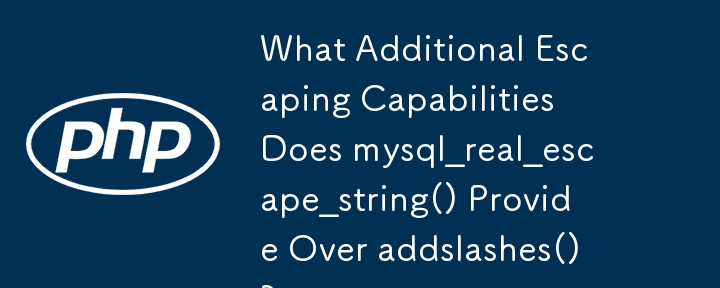

What Are the Capabilities of mysql_real_escape_string() That Exceed Those of addslashes()?
In web development, functions like mysql_real_escape_string() and addslashes() play crucial roles in safeguarding applications from SQL injection attacks. However, understanding the nuances between these functions is essential to ensure optimal security.
The Role of DB-Specific Functions
While there may be alternative options like parameterized queries, database-specific functions like mysql_real_escape_string() offer specific advantages:
Capabilities of mysql_real_escape_string()
mysql_real_escape_string() enhances addslashes() by adding slashes to additional characters, including:
In contrast, addslashes() only adds slashes to the following characters:
Vulnerability to SQL Injection with addslashes()
Despite its functionality, a webapp that relies solely on addslashes() remains vulnerable to SQL injection attacks. This is because addslashes() does not escape all characters that could potentially be exploited, particularly double-quotes (").
For instance, consider the following query:
SELECT * FROM users WHERE username = '" . addslashes($_POST['username']) . "';
An attacker could bypass the addslashes() protection by inputting a username like " OR 1 = 1. This would result in the following query:
SELECT * FROM users WHERE username = "" OR 1 = 1";
This query would return all users in the database, as the condition " OR 1 = 1" always evaluates to true, allowing the attacker access to sensitive data.
Conclusion
While addslashes() offers basic protection against SQL injection, mysql_real_escape_string() provides a more robust defense by escaping a wider range of characters specific to MySQL. As such, for maximum security, web developers should prioritize using database-specific functions like mysql_real_escape_string() or consider adopting parameterized queries to eliminate any vulnerabilities associated with input handling.
The above is the detailed content of What Additional Escaping Capabilities Does mysql_real_escape_string() Provide Over addslashes()?. For more information, please follow other related articles on the PHP Chinese website!




